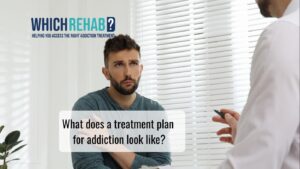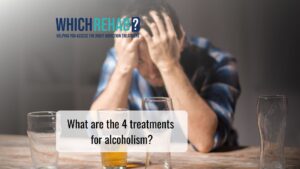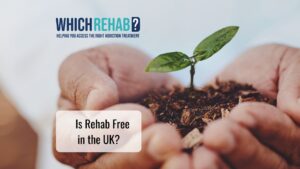Drug counselling aims to help the person going through an addiction to recover safely from drug abuse. Whether you are dealing with cocaine addiction, cannabis addiction or any other drug including prescription drugs, counselling sessions focus on teaching individuals how to cope with their cravings whilst overcoming the existing addiction.
Each specialist counsellor understands each case of drug abuse is different and use their expertise to help find the right treatment at the right time. Just by preparing to ask for help, you are moving forward and deciding to better your life. Acknowledging dependency is hard, but addiction can be debilitating and potentially deadly. When you realise you have an addiction, one of the bravest things and most difficult things to do is seek help and Which Rehab is here to help and support you take that step.
In order to make a FULL recovery from drug addiction, it is imperative that a profound change in mindset and outlook is achieved and drug counselling is integral to achieving this. Drug counselling can support a person in achieving sobriety but is also most helpful following on from a drug detox, rehab programme or a period of continued sobriety.
ARE YOU NEEDING DRUG REHAB?
Our team of rehab and addiction specialists are on hand to talk to you day or night. Let us help you take back control.
When Is Drug Counselling Appropriate?
The aim of drug counselling is to help you explore in a safe environment, the issues that are underpinning your addiction and to help you move forward. It is not a counsellor’s job to provide you with answers, but to help you recognise aspects you are struggling with and help you find your own answers to challenge negative or unhelpful thought processes. The sessions with a counsellor also give people the chance to share personal struggles with others who may have or are going through similar experiences, providing the reassurance that they are not alone.
Drug addiction is also more than physical dependence. Even after detox, when your body is no longer addicted, you’re at high risk for relapse.
Certain psychological and social factors can be powerful triggers that lead to relapse:
- Stress, especially sudden life stresses
- Cues in the environment, e.g living environments
- Social networks, like spending time with friends who continue to use
These things can create a strong ongoing urge to use again. Counselling helps you escape cravings and learn to manage what life throws at you without the dependency on drugs.
What Is The Role Of A Drug Counsellor?
Drug addiction counselling involves building trust between you and the counsellor so you can express emotions and experiences without feeling judged. They offer individual support and guidance throughout your journey and assist in creating a personalised plan for recovery and ongoing treatment.
There are many different approaches to treating drug abuse however most drug counsellors will cover these basic aspects of addiction counselling:
- Explore the potential cause of drug use and/or abuse.
- Increase awareness of negative patterns in thought and behaviour
- Identify triggers
- Develop a personalised plan for specific struggles, needs and goals
- Explore coping mechanisms
- Create a long term plan for sustaining sobriety
- Provide unbiased support throughout recovery
- Create an ongoing plan for sobriety after sessions
BREAK FREE FROM ALCOHOL ADDICTION
It can feel hopeless falling into the pit of alcohol addiction. Don't struggle alone, help is at hand.
Common Types Of Counselling Therapies Used To Effectively Treat Drug Addiction
There are many different counselling approaches and therapies available. A drug counsellor will usually use a number of approaches for optimum effect over a course of counselling sessions depending on different factors and offer various settings in the form of individual, family or community-based treatments.
Individual – This involves sessions between the client and counsellor. The focus is on the individual and their personal struggles with drug addiction.
Family – Addiction can affect the whole family unit and have an impact on interpersonal relationships. Family counselling enables both the client and families to get support and create a productive and loving environment to positively help in the healing process.
Community-based – This provides the opportunity for individuals to meet other people who have experienced similar difficulties and are at the same stage in their life of wanting to achieve sobriety again and share their experiences.
Common types of counselling used to effectively treat drug abuse or addiction include:
CBT (Cognitive Behavioural Therapy)
In Cognitive Behavioural Therapy, or CBT, the emphasis is on inducing a cognitive change in the person’s thought processing through using the power of challenging and suggestion.
DBT( Dialectical Behavioural Therapy)
With Dialectical Behavioural Therapy, or DBT, the emphasis is on building a strong therapeutic working relationship with the counsellor so that a very personalised and in-depth approach can be used in addressing behaviour.
Integrated Counselling Therapy
This is where a psychologist or counsellor qualified in psychologically, will integrate both counselling and psychotherapeutic approaches for maximum effect
Person-Centred Counselling
Person-centred counselling focuses on healing the individual as a whole person and not just one singular aspect, i.e addiction.
Counselling is most effective face to face but we also offer Skype counselling and telephone counselling for those that require more flexibility or feel uncomfortable leaving the safety of their home.
Sober Guides Counselling Services For Drug Addiction And Substance Misuse
Finding the right drug counsellor, one that you feel comfortable with to help you overcome your addiction and personal barriers and maintain sobriety isn’t always easy. Here at Which Rehab we can help; Sober Guide only offer professional counselling, provided by fully qualified BACP registered Counsellors, specialising in the treatment of drug, alcohol, and behavioural addiction and substance misuse.
We also offer counselling for the family that are affected by a loved one’s addiction and have a vast number of highly experienced and fully accredited registered alcohol counsellors based all over the UK.
Each addiction counselling programme is designed to address each individuals personal treatment needs and is very person-centred, incorporating all the various types of counselling that successfully treat addiction and dual diagnosis. Counselling treats a wide range of substance and behavioural problems; including those suffering from dual diagnosis illnesses such as anxiety, depression, borderline personality disorder, bipolar disorder, post-traumatic stress disorder and obsessive-compulsive disorder.
We can find you the perfect drug counsellor near me, search our directory or contact us to take care of all the necessary arrangements today.





